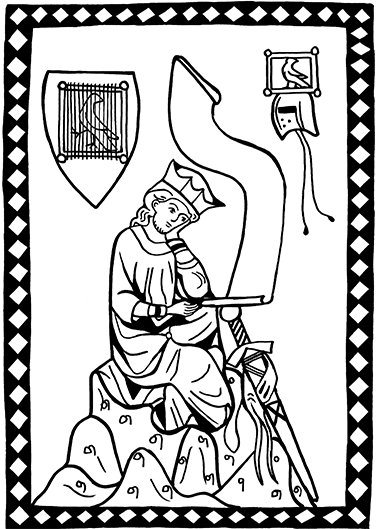
Station 1
The Start
Who was Walther?
Walther von der Vogelweide was a medieval star, a minnesinger and a political poet, whose songs and poems had far-reaching effects in the German lands. Nevertheless we know very little about him; there are almost no historical documents concerning him. What is known about this great singer has been derived from his poems, which must be balanced against the historical facts. Or, more cynically put, we have to figure out Walther’s life for ourselves.

Research into Walther agrees on one thing: he was born around the year 1170. About his youth next to nothing is known, as Walther von der Vogelweide only emerges on the public stage after 1190, when he arrives at the court of Frederick I, Duke of Babenberg, at Klosterneuburg near Vienna. There Walther studies under the court singer Reinmar the Old and, after a short time, he becomes his master’s bitterest rival. This feud and the death of his sponsor Frederick I are the reasons why Walther must leave the Babenberg court and, in retrospect, why he finds little good to say about it:
Dêswâr ich gewinne ouch lîhte knollen: sît si die schalkheit wellen, ich gemache in vollen kragen. ze Ôsterrîche lernt ich singen unde sagen: dâ wil ich mich allerêrst beklagen.
Truth to tell, I am bursting with rage; since they ask for vulgarity, I will stuff it down their throats. Austria was where I learned the singer’s art, so that is where I will take my grievance first.
Walther thus leaves Klosterneuburg following a dispute, and shortly thereafter places himself at the service of Philip of Swabia. Philip is the Hohenstaufen candidate for the German throne, one of two claimants for the position at that time. Walther, with a certain pride, writes “I am appropriated by both the kingdom and the crown”.
With good reason: Philip needs not only a singer at court, but more especially a political propagandist in the struggle for the throne against his Guelph opponent, Otto. The minnesinger becomes a sought-after political lyric poet. In this role, similar to modern musicians, Walther too is often on the move, looking for new engagements that take him through the entire German empire of the time. As early as 1200 he is for example a guest of Leopold VI in Vienna, also working as a singer at the courts of the Landgrave Hermann of Thuringia, Henry of Mödling and Dietrich of Meissen.
Walther is nevertheless not choosy in his search for firm engagements. After the murder of Philip of Swabia in 1208, the latter’s former propagandist happily offers his services to the previous anti-king, the Guelph Otto IV, of (and about) whom Walther writes:
Hêr keiser, sît ir willekomen. der küneges name ist iu benomen: des schînet iuwer krône ob allen krônen.
Welcome to you, Lord Emperor! Yours is no longer the title of king, thus your crown outshines all others.
Walther’s praise of the crown still does not get him what he so ardently desires – namely a fief. Thus he successfully places himself at the service of the Hohenstaufen Frederick II, who this time answers Walther’s pleas and awards him an estate.
Ich hân mîn lêhen, al die werlt, ich hân mîn lêhen.
I have my fief, O world, I have my fief!
Walther can probably enjoy his fief for around a decade, although we do not know exactly what it involved. Walther knows the duties associated with it, however, and in his last work calls for participation in Frederick II’s Palestine crusade and leaves us in no doubt as to which side he believed was in the right.
Kristen juden unde heiden jehent daz diz ir erbe sî: got müez ez ze rehte scheiden durch die sîne namen drî. al diu welt diu strîtet her: wir sîn an der rehten ger: reht ist daz er uns gewer.
Christians, Jews and heathens, all claim this land as their heritage. May God decide the matter justly in virtue of His Trinity. The whole world lays claim to it. Our claim is justified; thus it is right that He grants it to us.
Walther will not learn of the outcome of the crusade, as he dies circa 1230. Where is not exactly known, although there is some evidence for Wurzburg. Walther’s biography thus ends with what seems a constant refrain: a question mark.
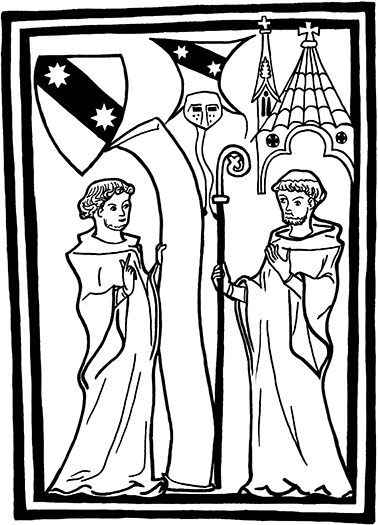
Station 2
Training
Augustinian monks as the makers of masters?
Nieman kan mit gerten kindes zuht beherten: den man zêren bringen mac, dem ist ein wort als ein slac.
Bringing up children with violence cannot succeed. For those who may become honourable men, a word will have the same force as a slap.
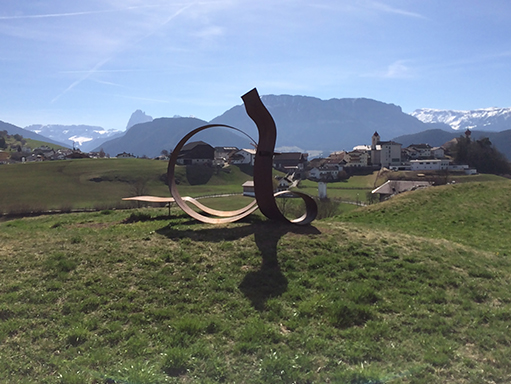
Even though he gives advice on bringing up children, like so much in the Walther’s life, his childhood and youth are a complete mystery. Thus we can also only speculate about his adoption of the singer’s life, and similarly about his training.
If we assume that Walther grew up in the Lajener Ried, we can equally assume that he pursued his training at the Augustinian monastery of Neustift. This would fit in with what we know of the monastery – recently founded at the time of Walther’s birth – as the training of the young canons there particularly involved music.
But geographical proximity to Lajen is not the only reference point upon which researchers rely: the protagonists also fit the bill. Konrad von Rodank, for instance, the provost of Neustift in Walther’s youth and later one the most important bishops of Brixen, was a recognised supporter of music and poetry. Walther’s training at Neustift would also explain his admission to the Babenberg court near Vienna, as there existed close relations between Neustift and Klosterneuburg. Not least it was Hartmann, Bishop of Brixen and former Provost of Klosterneuburg, who considerably advanced the establishment of Neustift.
The Viennese Court, however, is an aspiration of which Walther must prove himself worthy.
Daz ist der wünneclîche hof ze Wiene: in hirme niemer unz ich den verdiene, sît er sô maneger tugende mit stæter triuwe pflac.
This is the wonderful court at Vienna: I shall not rest until I earn my place there, as it has faithfully and constantly had so many merits.
Walther is thus aware that his acceptance in Vienna as an entirely unknown quantity, not to mention his poetic learning with Reinmar the Old, were all privileges. And the fact that he will enjoy these privileges is probably the result of the assistance of clergyman whose network included not only the monasteries, but also the most important courts.
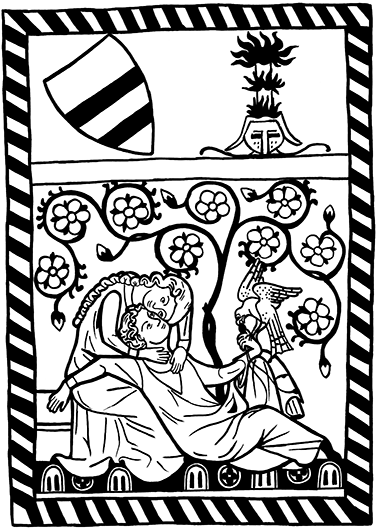
Station 3
The Minne
Courtly love and romantic love, ladies and girls
Minne ist minne, tuot sie wol; tuot sie wê, sô enheizet sie niht rehte minne. sus enweiz ich, wie si denne heizen soll.
Love is love if it does good. If it does harm, you cannot rightly call it love; what you should call it, that I would not know.
The term “Minne” comes from the Middle High German and indicates the veneration of a socially well-placed lady. The Minnesang (“minnesong”) of the 12th and 13th century is a ritualised form of such veneration, with the minnesinger as a sort of professional admirer, a form of entertainer who focuses on praising the ladies of the court.
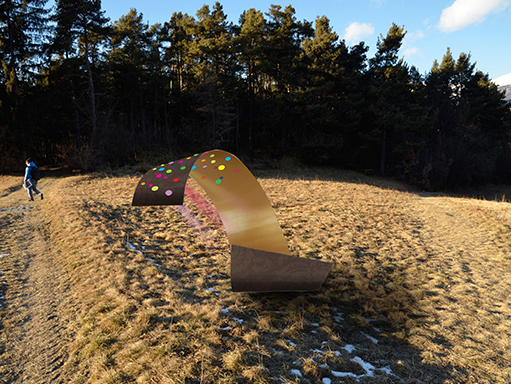
The minnesong was not originally sung by professionals, but rather formed part of the wooing of a lady by a high-born knight. While a knight could prove his physical skills as a hunter and at tournaments, the declaration of a minnesong would also show off his mental acumen and that he was thus culturally worthy of the lady.
Walther von der Vogelweide is regarded as the greatest minnesinger of the German High Middle Ages. He is a master of the classical minnesong, namely the one-sided admiration of a lady. The motivation for such admiration is not love or affection, but rather a plain and simple order on the part of a lord. Walther thus toured the courts of the German empire and earned his bread as a professional singer.
While he was most definitely not the only one of his time, he was however certainly the best. This at least was the view of Gottfried of Strasbourg in his work “Tristan”. For him it was clear: Walther, the Nightingale of the Bird Pasture, was the number one, striding ahead of all other minnesingers:
Ich wæne, ich si wol vinde, diu die baniere vüeren sol: ir meisterinne kan ez wol, diu von der Vogelweide. hî wie diu über heide mit hôher stimme schellet! waz wunders si stellet! wie spæhes organieret! wies ir sanc wandelieret.
I believe I know now, who should carry the banner: Your master, he of the bird pasture, von der Vogelweide, can do this. Hark, how over the heath his high voice does sound, what miracles he achieves! How artistic the music he makes! How well he can vary his song!
Walther is thus regarded as a master of the classical minnesong. And he too is the very one who breaks its rules. He is the first to sing of a reciprocal love. As he says in one of his songs, “Courtly love is pointless if it is one-sided. It must be mutual, so that it goes through two hearts“.
Courtly society first has to adapt to the new tone with which the minstrel not only serenades ladies of the court, but also simple girls in order to win their affection. While in Walther’s songs noble ladies, “elegantly dressed and with finely bound head” proceed through his verses with modesty, he sometimes treats simple girls rather differently:
Wes er mit mir pflaege, niemer niemen bevinde daz, wan er unt ich, und ein kleinez vogellin: tandaradei, daz mac wol verswigen sin
That which he did with me, no one else ever shall know just he and I and a little bird, tandaradei. This will keep our secret.“
Courtly veneration is replaced by something more concrete, more ambiguous. Tandaradei indeed.
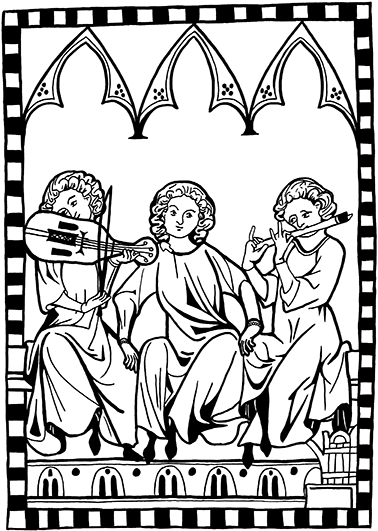
Station 4
Origin
Von der Vogelweide: what a name for a “nightingale“!
Documentary evidence relating to Walther von der Vogelweide is extremely scarce: as a matter of fact, there is only one single mention of Walther outside the world of poetry. It comes from the time when he was not only singing for Philip of Swabia, but had also vehemently expressed support for him. Bishop Wolfger of Passau, a very active advocate of Philip, noted on 12 November 1203:
Walthero cantori de vogelweide pro pellicio V solidos longos
Five shillings for a fur coat for Walther, the singer from the bird pasture.
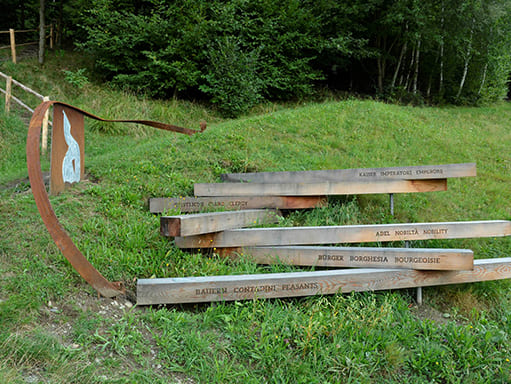
This mention is interesting for two reasons. On the one hand it shows us that Walther enjoyed a level of social respect. He is finally awarded his due in the same way as the Bishop’s closest employees. He was publicly placed on the same footing as them, with the fur coat simultaneously serving both as acknowledgment and payment.
Apart from the purely financial information, the document has a second aspect: Walther is identified in terms of his origins: “de vogelweide”, i.e. von der Vogelweide. But does this alone clearly indicate his origin?
This question must initially be answered with an unequivocal “no”. A clear indication of a person’s origin usually refers to a locality or an estate. A “Walther vom Lajener Ried” would for instance have saved the researchers a considerable amount of work. In Walther’s time there were numerous bird pastures, and thus many dispute that the name refers to a place of origin: “from the bird pasture”, so the theory goes, is simply a sort of nom de plume. Walther could thus equally have come from the Waldviertel in Lower Austria, Dux (Duchcov) in Bohemia, Franconia, Thurgau, Wurzburg, Frankfurt, Feuchtwangen or indeed the Lajener Ried: places with or without bird pastures.
Except for one thing: contrary to the assertion that it was merely an invented name is the fact that it can justifiably be assumed that “from the bird pasture” could at the time of Walther be understood as a geographical term. There were extensive bird pastures in and around Lajen: the name “Waidbruck” refers to pastures and hunting grounds. The bird pastures of Lajen were not remote or hidden away, but rather enjoyed a prominent location on the Brenner route.
This route was Europe’s central north-south axis and, even at that time, was one of its most frequented routes. Travelling on such medieval roads was also addressed by Walther, for example in a sort of morning prayer:
Mit sælden müeze ich hiute ûf stên, got hêrre, in dîner huote gên und rîten, swar ich in dem lande kêre.
With blessings may I rise today; Lord God, to go under your protection and ride where I shall in the land.
Walking, riding, travelling: those wishing to journey from northern lands to Rome in the Middle Ages used the Brenner Pass, the lowest crossing point over the main Alpine ridge. At Waidbruck all travellers – merchants, ministeriales, high clergy, even emperors – had to cross to the other bank of the River Eisack. For this reason alone the bridge location gained a special significance. The renown of the area was also helped by the fact that religious landowners such as the monasteries of Augsburg, Freising, Brixen, Neustift or Tegernsee all held possessions in Lajen in the High Middle Ages.
The prominently located bird pastures in and around Lajen were thus a well-known feature. Bishop Wolfger of Passau, himself a seasoned traveller, should have recognised the reference to the place contained in the surname of the singer he had rewarded. Walther, a have-not, probably gave himself the name when he began his career as a singer. From this perspective the name clearly appears to indicate his origins. This ingenious name was thus not a marketing gimmick, but at that time a possibly incontestable geographical reference to the Lajener Ried.
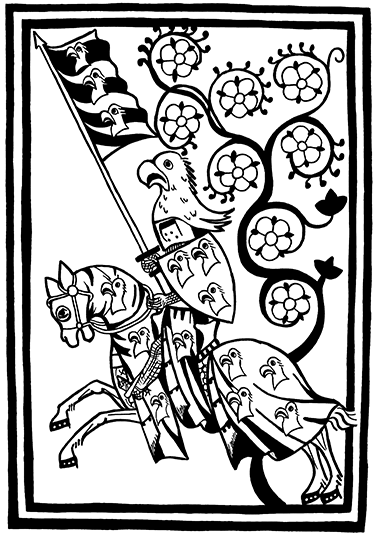
Station 5
The Propaganda
A literary all-rounder
Walther von der Vogelweide is seen as the most important minnesinger of the High Middle Ages. His fame is however not solely based on minnesong: Walther was the first literary all-rounder of his time. He could not – or would not – live from minnesong alone, which is why, during his career, he also becomes a master of the so-called Spruchdichtung, spoken poetry that is politically and socially critical.

Walther’s reasons for extending his repertoire so widely can be explained by the fact that the medieval literary business model was different from nowadays. In the absence of printing, poems had to be “bought” along with their creator. The professional poets of the Middle Ages thus earned their keep by working at the courts of the German empire. Or, as Walther says:
Die wîle ich weiz drî hove sô lobelîcher manne, sô ist mîn wîn gelesen unde sûset wol mîn pfanne.
As long as I know three courts held by such praiseworthy men, then my wine is assured and my pan will be sizzling nicely.
By appointing the minnesinger to court for a certain time, the sovereign prince would provide for sizzling pans, while in return the singer would entertain the prince and his guests. Keeping a court minnesinger was obviously one way to maintain a good image in medieval society.
Walther’s career began in Klosterneuburg, near Vienna, at the court of Frederick I, Duke of Babenberg. The duke energetically promoted the young artist but, when Frederick died, the now nearly 30-year old singer had to look for a new sponsor. He found one who was as famed as he was rich: Philip of Swabia, the Hohenstaufen candidate for the German throne and thus the rival of the Guelph candidate, Otto of Brunswick. From this time originates what is probably one of his most famous poems, the so-called first Reichsspruch (“imperial ode”):
Ich saz ûf eime steine und dahte bein mit beine, dar ûf satzt ich den ellenbogen; ich hete in mîne hant gesmogen daz kinne und ein mîn wange. dô dâhte ich mir vil ange, wie man zer werlte solte leben
I sat upon a stone and crossed one leg over the other, upon which I placed my elbow. On my hand I rested my chin and a cheek. Then I thought hard about how we should live in the world.
The singer from Lajen had so far earned his bread addressing philosophical questions in lyric love poetry and minnesong. Philip’s requirements were completely different, however. He did not need a romantic, he needed an unflinching propagandist who knew how to convince other princes of the merits of their sovereign. And this was where Walther’s outstanding talents shine through: already a master minnesinger, he rises to the new challenge of and becomes a master of spoken poetry.
Ideologically Walther proves himself entirely flexible. He praises the Hohenstaufen politics of Philip of Swabia, but after Philip’s murder in 1208 immediately switches to the opposing camp of the Guelph, Otto IV, who is crowned emperor in 1209. Walther is once more on the side of the powerful – but not for long. Walther mocks Otto’s avarice, thus the emperor and his propagandist part company.
Ein vater lêrte wîlent sînen sun alsô, ›sun, diene manne bœstem, daz dir manne beste lône.‹ hêr Otte, ich binz der sun, ir sît der bœste man, wand ich sô rehte bœsen hêrren nie gewan: hêr künec, sît irz der beste, sît iu got des lônes gan.
A father once, in times long gone, advised his boy, ‘Son, serve the meanest man, so that the best one gives you your reward.’ I am the son; and you, Lord Otto, are the meanest man. I never served a nobleman so bad and downright mean. You are, Lord King, the best. God give you means to grant reward!
It probably exasperates Walther that Otto will not grant him a fief, which would bring financial security, provide protection in old age and a change from his irregular life. Walther therefore seeks anew and is not afraid to switch allegiances again: this time as an advocate in the service of the Hohenstaufen emperor, Frederick II. The change is worth it: Walther gets his fief, his plan pays off.
No matter how often Walther changes masters, in one aspect he always remains true to himself: he is always on the side of the secular in the struggle against the spiritual powers. Whenever emperors or kings stand up to the Pope, they have Walther on their side. Nor is he afraid to put spiteful words into the Pope’s mouth:
er giht ›ich hân zwên Allamân undr eine krône brâht, daz siz rîche sulen stœren unde wasten. ie dar under füllen wir die kasten: ich hâns an mînen stoc gement, ir guot ist allez mîn: ir tiuschez silber vert in mînen welschen schrîn. ir pfaffen, ezzent hüenr und trinkent wîn, unde lânt die tiutschen leien magern unde vasten.
He says: “I have placed two Alemans under one crown, so that they will confuse and devastate the Empire. Meanwhile we will fill our coffers. I made them come to my offertory box; everything that they have is mine. Their German silver will flow into my southern treasury. You clerics, eat chicken and drink wine, and let the German laymen fast and grow thin.”
This hostility to the Pope is widespread among the poets of Walther’s time, probably also because it is a question of financial survival. Walther’s client is ultimately the crown and secular well-being is moreover in the end more important to him than the promise of eternal life.
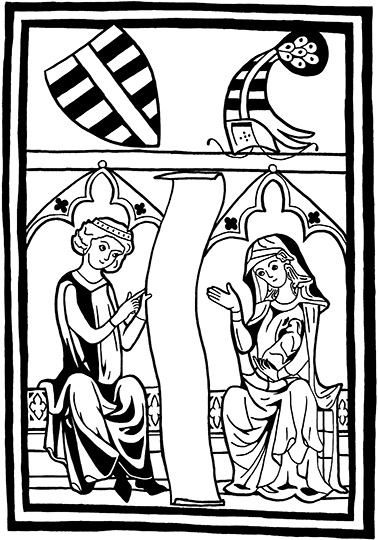
Station 6
Court life
Walther, der Profi
Ir sult sprechen „willekomen“: der iu maere bringet, daz bin ich. Allez das ir habt vernomen, daz ist gar ein wint: nû frâget mich. Ich wil aber miete: wirt mîn lôn iht guot, ich gesage iu lîhte daz iu sanfte tuot. Seht waz man mir êren biete.
Say “Welcome!”, for I am he who brings you news. Everything you have heard so far, is as nought: but now ask me! Of course I will expect a fee for my services and, if it is good, I will tell you things that will please you. So weigh up what you wish to offer me.
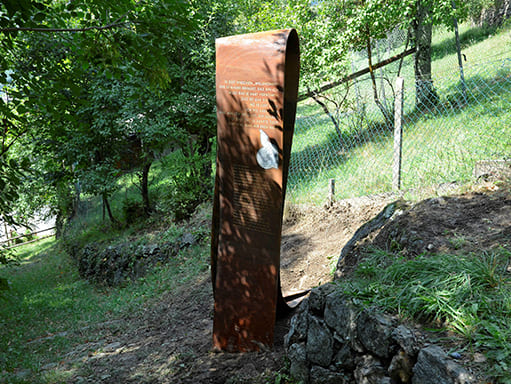
Walther von der Vogelweide himself was in no doubt that he was a literary professional, and not only in the sense that he was a master of the art of poetry and singing: Walther was a professional artist in the true sense of the word, one who made a career of singing and in this way earned his living.
In order to understand this thoroughly medieval business model, we must more closely examine life at court. Sovereign princes, counts, dukes, in short the wealthy aristocracy of the Middle Ages gathered people around themselves to bring a touch of high culture to the interior of their dreary castle walls. Scholars visited the courts, as did professional entertainers such as Walther von der Vogelweide.
His appearances before court audiences were not just for entertainment purposes, but also and above all to reflect well upon his respective lord; the minnesinger would sing the praises of the lady of the house in the highest terms, constructing a literary monument to her merits.
Frouwe, enlât iuch niht verdriezen mîner rede, ob si gefüege sî. möhte ichs wider iuch geniezen, sô wær ich den besten gerne bî. wizzet daz ir schœne sît: hât ir, als ich mich verwæne, güete bî der wolgetæne, waz danne an iu einer êren lît!
Lady, may my words please you, if it should be seemly. If I might be rewarded by you for this, I would gladly belong among the best. Know that you are beautiful! You possess, I am convinced, not only beauty but also inner merits, so much praiseworthy can be found in you alone!
… and not only in the lady, but also in the lord of the house. Should he require praise for political reasons, Walther was ready with his poetry. The singer at court was also a status symbol for the lord: the better the poet, the more cultivated the master.
This business model is naturally based upon mutual advantage – quid pro quo. While the reputation of the minnesinger and his work should as far as possible be reflected to the benefit of the lord of the house, the latter had to ensure a living for his court poet. And that, for Walther, is the rub: he believes, rightly or wrongly, that his efforts are constantly undervalued.
Thus his songs repeatedly contain verses in which he bemoans the tightfistedness of his sponsors, without consideration for their rank or standing. Walther for example hit out – in a literary sense, of course – at Emperor Otto IV, who supposedly paid him less than he thought due.
vil schiere maz ich abe den lîp nâch sîner êre: dô wart er vil gar ze kurz als ein verschrôten werc, miltes muotes minre vil dan ein getwerc; und ist doch von den jâren daz er niht enwahset mêre.
Straightaway, I measured him again – his body by his generosity, and then he turned out far too short, like poorly cut cloth, his heart more stunted than a dwarf. And more than that, he’s of an age when he will grow no more.
The notions of fair reward seem in this case to be highly divergent, and even result in a breach with Otto. This at least is the interpretation of Walther’s verses in the so-called “Ottenton”. Or do they conceal something more? A political breach perhaps? In this case the public criticism of Otto’s meanness was maybe just a pretext for discrediting a political opponent.
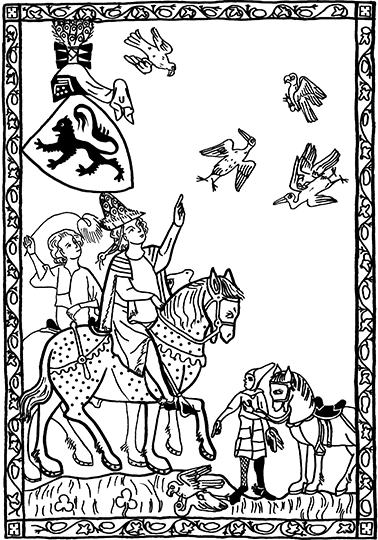
Station 7
The Vogelweide
Pastures and politics
Sending birds out to pasture does not at first sight seem to make much sense: unless they are birds of prey. And indeed special places, bird pastures, were set aside for falconry training purposes in the Middle Ages. They were therefore typical of Walther’s time, but were lost with the disappearance of falconry.
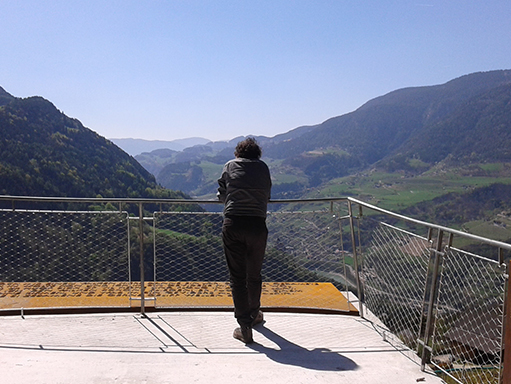
Falconry is the art of hunting with specially trained birds of prey. Species such as falcons and sparrowhawks were trained to hunt wildfowl and smaller furred game. Birds were thus both the killers and the kill. Falconry was not however a sport for the masses, but rather an indulgence of the knightly classes that reflected one’s status: a pleasure to which emperors too were devoted. Frederick II of Hohenstaufen was for example not only Walther’s sponsor and the embodiment of an emperor with many interests, but also a particular expert in falconry. His book on hunting with birds remained a standard work for falconers worldwide until modern times.
Birds however do not only seem to have played a special role in the knightly world: they also had a special meaning for poets as musicians of nature and friends of the minnesingers, with falcons having a special place in their lyric poetry to symbolise a beloved. Der von Kürenberg for instance wrote:
Ich zôch mir einen valken mêre danne ein jâr. dô ich in gezamete als ich in wolte hân und ich im sîn gevidere mit golde wol bewant, er huop sich ûf vil hôhe und floug in anderiu lant. Sît sach ich den valken schône fliegen: er fuorte an sînem fuoze sîdine riemen, und was im sîn gevidere alrôt guldîn. got sende si zesamene die gerne geliep wellen sîn!
I kept a falcon for over a year. Once I had tamed him exactly as I wanted and entwined his plumage with golden ribbons, he soared up high and flew away to other parts. Since then I have seen him circling majestically: from one foot hung strips of silk, while his feathers shone golden-red. May God bring together those who wish to be loved.
Not only the bird pastures fell into oblivion over time. The literature of the Middle Ages also fell into a centuries-long slumber, from which it was only awakened by the Romantics in the 19th century with the revival of interest in the period. Medieval ideals were glorified, chivalry celebrated, and a sense of identity established; enthusiasm for the national past also spurred research.
Both the enthusiasm for nationalism and for the Middle Ages therefore aided the rediscovery of the bird pastures of the Lajener Ried in 1867. This discovery was not only important from a historical research perspective, but also added fuel to the ever stronger fires of nationalism: Walther von der Vogelweide, the German minnesinger par excellence, was a (South) Tyrolean! It is no coincidence that, since 1889, Walther’s monument has graced Bozen’s central square, standing tall and gazing southwards, towards the language border. A poem was composed specially for the unveiling of the monument, as follows:
Ein Standbild, umlodert von Fackelschein, Erglänzt in die südliche Nacht hinein, Es flattern im Winde die Fahnen. — Das deutsche Volk aus deutschem Tirol, Es strömt herbei so freudenvoll, Zu ehren den singenden Ahnen.
“Hail, you noble and heroic poet!” Resounds in wood and field, The mountains echo the sound. “We always thought of you, we think of you today, We will think of you in suffering and joy! O singer of the most German of songs!”
Through no fault of his own, Walther is thus politically misappropriated: he is made into the symbol of South Tyrol’s German culture. This symbol gained in weight after the annexation of the region by Italy in 1919. However, such political motivations were anything but beneficial to the credibility of the Lajener Ried theory of Walther’s roots: nationalistic interests initially shone too strongly through the thesis.
This weight has since been cast off and, as stated, there is considerable evidence for Walther’s origins in the Lajener Ried. This is also reflected in the popularity of the Vogelweidhof (“bird-pasture farm”), whose guest books are full of comments from fans of Walther. Bird pastures thus still have a meaning, albeit a very different one from that during Walther’s times.
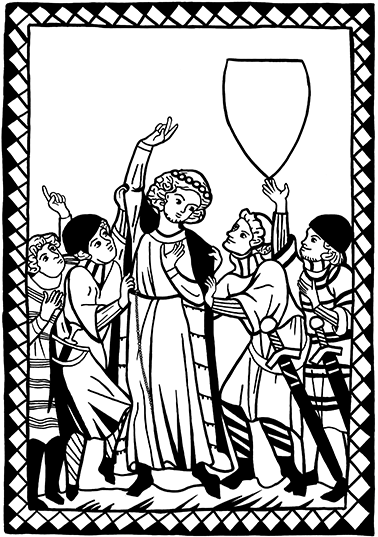
Station 8
Conclusion
A rebel and his legacy
wol vierzec jâr hab ich gesungen oder mê von minnen und als iemen sol. dô was ichs mit den andern geil: nu enwirt mirs niht, ez wirt iu gar. mîn minnesanc der diene iu dar, und iuwer hulde sî mîn teil.
Full forty years or more I have sung of love and how to lead one’s life. I enjoyed my time with others then. But now I have nothing more of this, save that it should profit you alone. Then may my love songs further serve you, and your goodwill be my due!
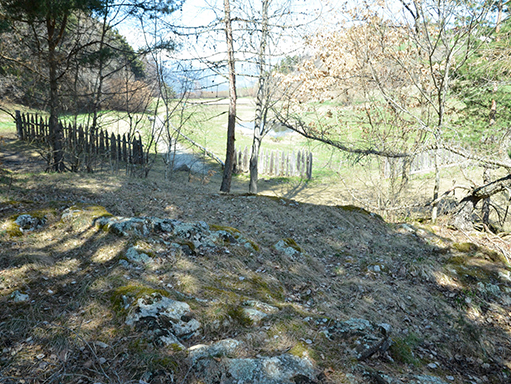
Walther von der Vogelweide left behind a literary œuvre that none of his contemporaries comes close to matching, either in terms of quantity or quality.
Walther’s works total some 500 verses, 90 songs, 150 sung poems and a religious lay – the result of some 40 years of work as a career minstrel and professional propagandist.
But more interesting than the mere numbers is an examination of the quality of Walther’s work. No matter how harmless may this king among minnesingers have been presented by the illustrators of manuscripts, or how harmless most of his verses appear to us today: Walther was anything but harmless, anything but accommodating – he was a literary rebel who pushed and indeed exceeded the boundaries, even taking on the Pope.
One of these limits is that between minnesong and political poetry. No one before Walther von der Vogelweide had mastered both equally. Even more seriously, Walther’s minnesong gradually distanced itself from the highly ritualised worship of noble ladies, which was less a genuine affection than a paid service. This “high Minne” is Walther’s daily bread: but he is also the first not to shy away from the shallows of “lesser Minne”. So he sings to simple girls, not to revere them, but to conquer them.
Ich kam gegangen zuo der ouwe: dô was mîn friedel komen ê. dâ wart ich enpfangen, hêre frouwe, daz ich bin sælic iemer mê. kuster mich? wol tûsentstunt: tandaradei, seht wie rôt mir ist der munt.
I came to meet him at the green: There was my true love come before. Such was I greeted, Heaven’s Queen! That I am glad for evermore. Had he kisses? A thousand and some: tandaradei, see how red my mouth’s become.
Walther not only made himself friends with this (for the time) shameless effrontery, he also smoothed the path for the lyrical love poetry that we know today.
Deep as the traces of Walther von der Vogelweide are in the history of German literature, very little is nonetheless known about his life and death. It is assumed that he died between 1227 and 1230. In the year 1227 he called for participation in the crusade led by the Hohenstaufen Emperor Frederick II, but probably did not live to see its end, as the event finds no further mention in his poetry.
Like the year of his death, the place of his death too remains a mystery. Much speaks for Wurzburg, yet there is no evidence for this, and thus we do not know Walther’s last resting place. Only his literary legacy is indisputable. At least that remains …
Owê war sint verswunden alliu mîniu jâr! ist mir mîn leben getroumet, oder ist ez wâr? daz ich je wânde ez wære, was daz allez iht? dar nâch hân ich geslâfen und enweiz es niht. nû bin ich erwachet, und ist mir unbekant daz mir hie vor was kündic als mîn ander hant. liut unde lant, dâr inn ich von kinde bin erzogen, die sint mir worden frömde reht als ez sî gelogen
Oh, where have all my years disappeared to? Did I dream my life, or is it true? Did what I believe really happen, was that everything? So I have slept and I still do not know. Now I am awake and all that I knew like the back of my hand is now unknown. The people and the land where I grew up as a child, have become foreign to me, just as if nothing was true.
Februar 2017 / chr
